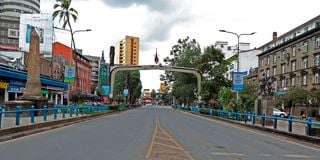Businesses lose billions as shops close over protests

An empty Kenyatta Avenue in Nairobi. Many business in the city and other major urban centres in the country remained closed yesterday due to protests against the high cost of living.
Many businesses remained closed on Tuesday as protests rocked the capital Nairobi and other parts of the country, resulting to losses of an estimated Sh3 billion, underlining the economic cost of the protests.
In a day of drama, the police were locked in running battles with pockets of protestors who lit bonfires and barricaded roads in various towns including Nairobi, Mombasa, Nakuru, Kisumu and Kisii. Nairobi streets, which are usually a beehive of activities on a typical Wednesday, were largely deserted as many businesses opted not to open in fear of looting by protestors.
The Kenya Private Sector Alliance (Kepsa) has now put numbers to the economic implications of the protests, and says that private sector is losing an average of Sh3 billion daily owing to the ongoing demonstrations which translate into subdued business activity across the country.
“Every time the country’s economic engines are closed for fear of theft and destruction from people who are taking advantage of the demonstrations, occasions unnecessary losses to the tune of about Sh3.0 billion daily. For a struggling economy, reeling from the effects of a prolonged drought, general elections, and economic slowdown last year and compounded by general global economic challenges, Kenya can ill-afford the political activities currently at play”, Kepsa says in a statement.
In the period between July 2022 and May 2023, the Kenya Revenue Authority (KRA) collected an average daily tax revenue of Sh5.3 billion. This implies that a daily loss of Sh3 billion to private sector is equivalent to 14 hours of the average tax collection by KRA.
The Federation of Kenya Employers (FKE) has also urged leaders to embrace social dialogue and pursue a win-win outcome, arguing that the protests are derailing productivity.
“The frequent disruption to business operations and free movement of people, goods and services is not good for the country. In addition, the workers' productivity is depressed due to the anxiety and uncertainty that comes with the protests,” said FKE Chief Executive Jacqueline Mugo.
The demonstrations are a double blow to businesses already recording reduced sales due to a drop in demand for goods and services from consumers owing to high prices.
For instance, Stanbic Bank Kenya’s monthly Purchasing Managers’ Index (PMI), which tracks business conditions in the economy using individual measures such as output, new orders, costs, selling prices, exports and employment, shows businesses faced tougher times in June compared to May.
It showed that businesses recorded reduced sales for the fifth month in a row last month after consumers cut spending due to cash shortages amid high inflation, shedding fresh light on how the private sector performed in June.
“Firms widely reported a lack of purchasing power among customers due to high inflation and cash shortages. The overall fall wholly reflected weak domestic markets, as new export business rose for the fourth month running,” said the survey.
The government has also been feeling the effect of the deteriorating business environment, after the KRA recorded lower-than-expected tax revenue collection in the first 11 months of the financial year 2022/23, hurting the government’s spending plan.






